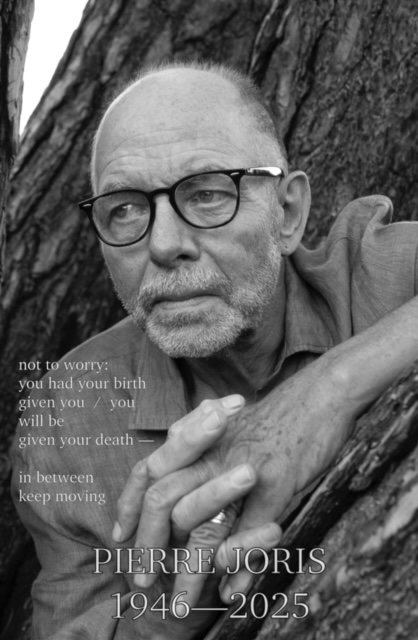boundary 2 and its community are mourning our friend Pierre Joris, whose work appeared in both boundary 2 and boundary 2 online:
Charles Bernstein, “NoOnesRose: An Interview with Pierre Joris”
Pierre Joris, “A Nomad Poetics Revisited: Poetry and Translation in a Global Age”
In Memoriam Pierre Joris (1946–2025)
Charles Bernstein
Pierre Joris is a poet, essayist, anthologist, and translator, each an aspect of multidimensional artmaking rarely seen among American poets. His poetry and poetics are interwoven with his anthologies of twentieth century “free thinking” world poetry (with Jerome Rothenberg) and of the poetry of the maghrib (with Habib Tengour), which, in turn, are an extension of his translations (Celan, Adonis, Blanchot, Schwitters, Picasso, Safaa Fathy, Meddeb, &c).
Joris’s works are never solemn, but they acknowledge the “darkness that surrounds,” as Robert Creeley once put it, that we are always behind our ideals, hopes, aspirations, premonitions, regrets, fears–behind both in the sense of supporting and after, trying to catch up, desperately for the most part, but in these poems not desperate but fortunate, in good humors and with humor.
American poetry is born in second languages, it is our bounty and the secret of our success, if we have any, as much as Samson’s long hair was, once upon a time, the source of his strength. That’s why any attempt to homogenize and assimilate undermines the foundations of our poetics.
Joris’s work is marked by a rare virtue for an American poet: courage: fierce and loving. Everybody is always talking about affect but no one ever does anything about it. We used to say “lifts your spirits” but that applies more to Thanksgiving balloons than to verse that challenges. I want a poetry and poetics, like Joris’s, that change my mind, puts me in the sway of currents of resistance and change. Where the courage is not just what is said but what is refused: the sanctity of the fixed place, nation or ideal, banner or standard. It’s not just the tyranny of monolingualism that Joris’s verse contests, it’s the tyranny of all forms of monomania: single-mindedness in perspective, style, politics, form, language, identity, desire. “I speak in voices / always always / other people’s voices / a thousand mouths.”–We all turned away from virtues when that meant some uppity guy telling us the way we lead our lives is base. What happens if the base speaks in a basso profundo, as in being pro fun with doing more than the done?
Intellectus is not a dirty word. While so much of American poetry culture has run from thick historical context and wit as if they were a European disease, Joris has made a poetry that overthrows the hierarchies but not the minding, tending, churning, plowing, fermenting, and fomenting.
I want to claim Joris as an American poet par excellence, but that is only if we understand “American” as dissolving into the “image nation” (Robin Blaser’s term)–“the city which is syntax”–of non-national possibility. To be neither here nor there, French nor German, Luxembourgish nor Americanische, is to inhabit a provisionality among and between, a toggling that creates a space of rhythmic intensities (“true movement unencumbered”) that confounds binaries and repels axiomatic allegiances.
In “An Alif Baa,” Joris speaks of the a “zig” connecting to “orphaned” zag, evoking the nomadic condition of letters before they coalesce into words, what he calls in another poem the “zigzag nomad.” The distance from the orphaned “zag” to the “zig” of history or place or name is “irreducible.” The space from zig to zag is the antinomian space between (“between lips / be silk between / be between,” “between the ephemeral & the invariant”). This is a space Joris claims as the nomadic possibility of poetry and thought, what sometimes goes by the name of imagination but also fancy, emptiness, and negation.
Joris’s poetry is an unexpected overlay of Expressionism (“eye turned inside out”) and Dada (“A fistful / of consonants / drifts from mouth to / mouth”), parataxis (“break the ice / to know”) and lyric (“what is is / shimmers, stammers / on the vocal-cords-bridge, in the / Great Inbetween / with all that has room in it / even without speech”).
Voicings and thing language.
His ever burning searching is tempered by the realpolitik (“postmortem”) of images, images that are uneasy, that propel a querical (queasy) inquiry.
Joris’s “daily song” is a tracing of a definite but undefined course. The poet recognizes the necessity of a rhetorical address from “the center of my center of nowhere.” No where but still always here, at this long-delayed hearing that determines neither guilt nor innocence but rather makes ways (makes waves) to actualize copability (the ability to cope), which along with adaption, translation, miscegenation, and élan is a guiding force of Joris’s beguiling works.
Adapted from The Kinds of Poetry I Want: Essays and Comedies (University of Chicago Press, 2025). See my conversation with Joris in boundary 2 50:4 (2023) and his contribution to 99 Poets/1999: An International Poetics Symposium, an issue of boundary 2 that I edited: 26:1 (1999).

Leave a Reply